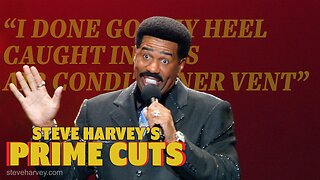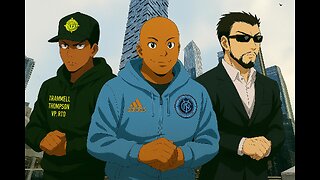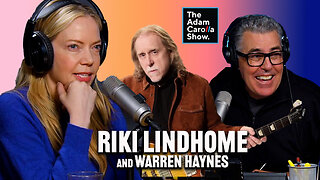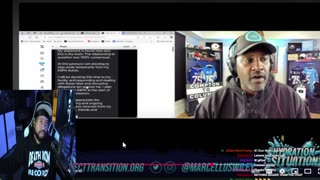Premium Only Content

bayou bunni calls out raw b and dj hamp
WELCOME!!! If you have any subjects you'd like me to slice and dice, feel free to leave a suggestion and you're also welcome to join me onscreen at any time.
$$$ For those who would like to treat me to a smoothie and/or support my channel, you may CashApp me at $dlong316 OR you can email me directly for another pay app source at darrellong36@gmail.com
**Participants waive all rights to privacy **
Please Subscribe and hit that Bell and like button!!! Share the Show!!
Disclaimer: Darrel Long features intellectual, fun, and triggering conversations with her community and guests. My content does not promote or support violence against any individual or group.
Instagram:
@darrel_long_
Cash App:
$dlong316
Questions, Suggestions: Connect with Darrel Long Email: darrellong36@gmail.com
Written Authorization is Required to use our content! Do not use, copy, screen record, screenshot, and/or download, any videos unless Written permission has been given. The request needs to be sent to: darrellong36@gmail.com
Thank You for your support, chat soon!
Fair Use Copyright Disclaimer
**FAIR USE**
Copyright Disclaimer under section 107 of the Copyright Act 1976, allowance is made for “fair use” for purposes such as criticism, comment, news reporting, teaching, scholarship, education, and research.
Fair use is a use permitted by copyright statutes that might otherwise be infringing.
Non-profit, educational, or personal use tips the balance in favor of fair use.
Fair use is a doctrine in the United States copyright law that allows limited use of copyrighted material without requiring permission from the rights holders, such as for commentary, criticism, news reporting, research, teaching, or scholarship. It provides for the legal, non-licensed citation or incorporation of copyrighted material in another author’s work under a four-factor balancing test. The term “fair use” originated in the United States. A similar principle, fair dealing, exists in some other common law jurisdictions. Civil law jurisdictions have other limitations and exceptions to copyright.
One of the rights accorded to the owner of the copyright is the right to reproduce or to authorize others to reproduce the work in copies or phonorecords. This right is subject to certain limitations found in sections 107 through 118 of the copyright law (Title 17, U.S. Code). One of the more important limitations is the doctrine of “fair use”. The doctrine of fair use has developed through a substantial number of court decisions over the years and has been codified in section 107 of the copyright law.
Section 107 contains a list of the various purposes for which the reproduction of a particular work may be considered fair, such as criticism, comment, news reporting, teaching, scholarship, and research. Section 107 also sets out four factors to be considered in determining whether or not a particular use is fair:
1. The purpose and character of the use, including whether such use is of commercial nature or is for nonprofit educational purposes
2. The nature of the copyrighted work
3. The amount and substantiality of the portion used in relation to the copyrighted work as a whole
4. The effect of the use upon the potential market for, or value of, the copyrighted work
The distinction between fair use and infringement may be unclear and not easily defined. There is no specific number of words, lines, or notes that may safely be taken without permission. Acknowledging the source of the copyrighted material does not substitute for obtaining permission.
The 1961 Report of the Register of Copyrights on the General Revision of the U.S. Copyright Law cites examples of activities that courts have regarded as fair use: “quotation of excerpts in a review or criticism for purposes of illustration or comment; quotation of short passages in a scholarly or technical work, for illustration or clarification of the author’s observations; use in a parody of some of the content of the work parodied; summary of an address or article, with brief quotations, in a news report; reproduction by a library of a portion of a work to replace part of a damaged copy; reproduction by a teacher or student of a small part of a work to illustrate a lesson; reproduction of a work in legislative or judicial proceedings or reports; incidental and fortuitous reproduction, in a newsreel or broadcast, of a work located in the scene of an event being reported.”
When it is impracticable to obtain permission, the use of copyrighted material should be avoided unless the doctrine of fair use would clearly apply to the situation. The Copyright Office can neither determine if a certain use may be considered fair nor advise on possible copyright violations. If there is any doubt, it is advisable to consult an attorney.
FL-102, Revised September 2010
-
 6:01
6:01
MudandMunitions
13 hours agoGriffin Armament 3X Prism Sight GPS3X Review & Range Test NY LEGAL AR-15 DIALED IN
12.1K2 -
 4:53
4:53
The Official Steve Harvey
13 hours ago $0.46 earned🎬 🤣 🎙️ Stay ready so you ain’t gotta get ready! 🔥 Watch Steve keep it ALL the way real on Prime Cuts
6.65K4 -
 11:34
11:34
Mrgunsngear
1 day ago $10.99 earnedSiege Suppressors ROC556 Low Backpressure Silencer Review 🤫
80.8K12 -
 50:53
50:53
Steve-O's Wild Ride! Podcast
2 days ago $6.47 earnedAre The Trailer Park Boys Smarter Than They Seem? | Wild Ride 258
35.4K40 -
 2:58:32
2:58:32
IsaiahLCarter
11 hours agoAPOSTATE RADIO EPISODE 012: Closing Down and Proceeding on Signal, with Trammell Thompson
75K16 -
 11:09
11:09
Forrest Galante
9 hours agoIs The Mammoth REALLY Coming Back From Extinction?
39.4K48 -
 1:00:52
1:00:52
Mike Rowe
6 days agoThe Sun Never Sets On Gene Simmons | #432 | The Way I Heard It
107K137 -
 1:58:31
1:58:31
Adam Carolla
19 hours ago $20.64 earnedJay Leno Does What Modern Politics Won’t: Taking Care of Family Without a Press Conference
73.1K17 -
 5:28:29
5:28:29
Akademiks
11 hours agoDay 2/30. Smurk on Stream?? 50 cent keep going at Big Meech. Kendrick to Buy Kanye West Catalog?
103K3 -
 1:35:28
1:35:28
BlackDiamondGunsandGear
15 hours agoThe TRUMP SLUMP?
52.3K7